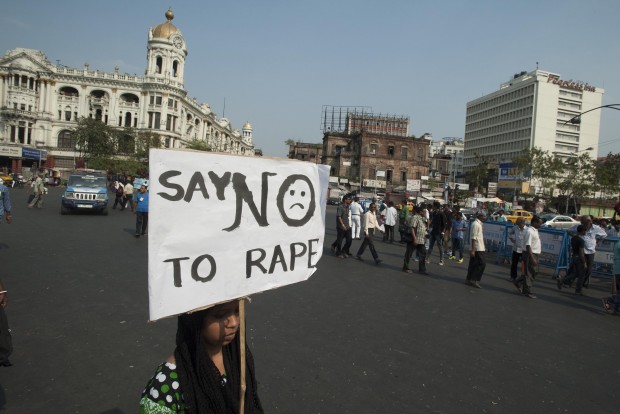Indian village council orders rape of two sisters for brother’s elopement

People participate in a silent protest to condemn the recent gang rape of a nun at a Christian missionary school in Kolkata, capital of eastern Indian state West Bengal, March 18, 2015. A 72-year-old nun was allegedly raped by a group of armed robbers in West Bengal in the wee hours of March 14. (Xinhua/Tumpa Mondal)
An unofficial, all-male village council in India’s Uttar Pradesh state has ordered the rape of two young sisters after their brother eloped with a woman of a higher caste.
The ‘sentence’ was handed down after the brother of two girls aged 23 and 15, the elder of whom is named Meenakshi Kumari, ran off with a married girl belonging to the dominant Jat community.
The council — locally known as a panchayat — also ordered for the sisters to be paraded naked with their faces blackened.
After receiving threats, Kumari and her family fled their village in UP’s Bhagpat district for New Delhi, some 50 kilometers away.
The dismaying punishment was brought to light after rights group Amnesty International launched a petition calling for local authorities to intervene immediately and save the girls from being raped.
Amnesty says in the petition: “Nothing could justify this abhorrent punishment. It’s not fair. It’s not right. And it’s against the law.”
According to the Indian newspaper Hindustan Times, Kumari filed a petition in India’s Supreme Court, seeking protection for herself and her family.
She alleged that local police filed a false narcotics case against her brother, under pressure from the Jat girl’s family. Even though he was granted bail by a local court, the family was too afraid to go back to the village to arrange surety documents to get him released.
A Supreme Court bench issued a notice to authorities, asking for a probe into the incident.
Kumari said in the petition that her brother and the girl were in love for the past three years. However, the girl was married off to boy from the Jat community against her wishes. A month after her marriage, the girl escaped her husband’s home and eloped with Kumari’s brother. The couple surrendered after alleged torture by the girl’s family and UP police.
The girl, who claimed she was pregnant with her lover’s child, was sent back to her parents while the boy was detained under a false drug case.
After Kumari’s family moved to Delhi, fearing for their lives, their house was allegedly vandalized and taken over by members of the Jat community.
In India, the caste system separates people into Brahmin priests, warriors, farmers and laborers, while the rest are called Dalits.
Dalits are low-caste Hindus and were once considered “untouchables”, performing the most degrading jobs.
The ancient caste system has prevailed in India – mostly in rural areas — despite the country’s economic success and exposure to international culture which has remolded social paradigms in the nation.





















































